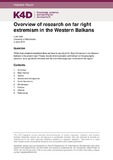| dc.contributor.author | Kelly, Luke | |
| dc.coverage.spatial | Western Balkans | en |
| dc.date.accessioned | 2019-07-08T11:57:02Z | |
| dc.date.available | 2019-07-08T11:57:02Z | |
| dc.date.issued | 2019-06-04 | |
| dc.identifier.citation | Kelly, L. (2019). Overview of research on far right extremism in the Western Balkans. K4D Helpdesk Report. Brighton, UK: Institute of Development Studies | en |
| dc.identifier.uri | https://opendocs.ids.ac.uk/opendocs/handle/20.500.12413/14571 | |
| dc.description.abstract | Far-right extremism is widespread in the Western Balkans and exists in both mainstream political parties and extremist groups and individuals. Most of the literature focuses on Serbian nationalist groups, but far-right groups are also present in Bosnia Herzegovina, Montenegro, Kosovo, Albania and North Macedonia. The literature focuses on explaining far right extremism in relation to the political cultures of the countries. It notes continuities with the politics of the 1990s in terms of organisations, personnel and nationalist ideas. Many far-right groups centre on continuing disputes over borders and ethnic victimisation in the Balkans, to which the ‘ethnic democracy’ practised by today’s political elites contributes. It also notes the perceived ‘Europeaness’ of liberal ideas on LGBT and women’s rights, against which some groups contrast their traditional, Orthodox, Eurasian or Slavic values. The spread of these discourses are analysed through media and internet sources. Far-right groups are shown to be linked to football supporters’ clubs, and to have experience in the Balkan wars or the recent Ukraine conflict in some cases. Sub-regional links within the Balkans are important, as are links with Russia, and there is some evidence of wider international links. Some studies look at relative social deprivation, criminal backgrounds and high levels of unemployment across the region, but most focus on political culture. The perceived threat of Islam is a theme of many groups, as well as migrants entering Europe through the Balkans. Far right groups are shown to be enabled by mainstream politics and institutions which agree with some of their extreme ideas and fail to clamp down on groups. | en |
| dc.language.iso | en | en |
| dc.publisher | IDS | en |
| dc.relation.ispartofseries | K4D Helpdesk Report;620 | |
| dc.rights.uri | https://www.nationalarchives.gov.uk/doc/open-government-licence/version/3/ | en |
| dc.subject | Governance | en |
| dc.subject | Politics and Power | en |
| dc.subject | Security and Conflict | en |
| dc.title | Overview of Research on Far Right Extremism in the Western Balkans | en |
| dc.type | Helpdesk | en |
| dc.rights.holder | © DFID - Crown copyright 2019 | en |
| dcterms.dateAccepted | 2019-06-04 | |
| rioxxterms.funder | Department for International Development, UK Government | en |
| rioxxterms.identifier.project | K4D | en |
| rioxxterms.version | VoR | en |
| rioxxterms.funder.project | 238a9fa4-fe4a-4380-996b-995f33607ba0 | en |

